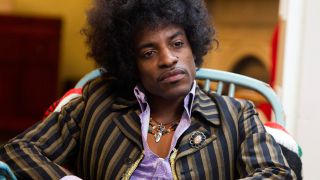At the 2013 Toronto International Film Festival, where the Jimi Hendrix film All Is By My Side had its world premiere last September, writer/director John Ridley informed the press, with no discernible sarcasm, that “I look back on the whole experience and it was all magical”. If that’s true, Ridley is a patient man. This summer the film finally reaches mainstream cinemas, following a difficult, controversy-dogged birth. The back-story of this divisive Hendrix biopic is not so much purple haze as red mist.
When the concept of Hendrix film was first floated, almost eight years ago, it was difficult to think of a figure worthier of the treatment, or a movie dream-team better qualified to bring Jimi back to life. Ridley, at the helm, was a sworn-in Jimi fanatic and a decorated screenwriter, soon to win an Academy Award for his 12 Years A Slave script. Flanking him was a promising young cast, led by André Benjamin (aka Outkast’s André 3000), who not only looked the part but sounded it too, having practised left-handed guitar six hours a day and perfected Jimi’s cosmic drawl. “It was never going to be a Vegas lounge act,” Ridley told Rolling Stone.
Also, the narrative chose not to rake over his superstar years, but focus instead on Hendrix’s 1966 London breakout (this despite being filmed in Dublin, where the Swinging Sixties were deemed “easier to recreate”). “The cradle-to-grave biopic has been done,” Ridley said in Filmmaker. “Leaving New York City as Jimmy James and coming back as Jimi Hendrix, that hasn’t been explored.”
The pieces were in place, then. But All Is By My Side ran into problems, right from the start. At the film’s inception, Ridley remembers, he was forced to take the independent route after being turned down by a major Hollywood studio (“The people I was pitching it to said: ‘We don’t get it’”).
A still greater obstacle was the formidable Experience Hendrix LLC. Though never shy of a posthumous release, in 2012 the star’s estate clamped down on this unsanctioned project, denying Ridley the use of Hendrix-written material in his soundtrack. When the filmmakers worked around the impasse – deciding to re-record early covers played by Hendrix in London – Experience Hendrix’s statements took on a mocking tone, describing the absence of Jimi tunes as “like making a movie about Lincoln without being able to use the Gettysburg Address”.
Further headaches arrived via the surviving members of Jimi’s 60s circle: Roger Mayer, who built the star’s pioneering guitar effects, questioned the film’s version of events in Variety (“It seems these naughty filmmakers haven’t researched anything properly”); Hendrix’s then-girlfriend, Kathy Etchingham, considered legal action after finding herself portrayed as a foul-mouthed rock chick and the guitarist as a violent thug. “It’s just completely made up,” she told the Sydney Morning Herald, of a scene where the guitarist beats her character, played by Hayley Atwell.
These bumps in the road will be forgotten if All Is By My Side proves to be a stone-cold classic, of course. And, based on early reviews, there’s potential. “All Is By My Side is long and unwieldy,” noted Henry Barnes in his four-star review in the Guardian following the Toronto premiere. “But you leave it thinking that the essence of the man has been brought to the fore.”


